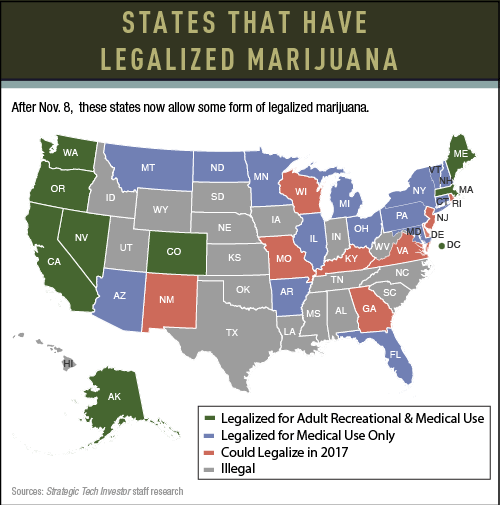When it comes to legal marijuana and cannabis biotech - which we've been discussing for several months now - there's an elephant in the room.
There's been a few recent comments from the Trump administration - though not the president himself - that paint recreational cannabis in a negative light.
During a Feb. 23 press conference, White House Communications Director Sean Spicer said he expects the Trump administration to seek "greater enforcement" of federal laws against marijuana.
Then, while speaking to reporters on Feb. 27 at the Justice Department, new Attorney General Jeff Sessions said, "I'm definitely not a fan of expanded use of marijuana."
Not surprisingly, that's inspired plenty of conjecture and worry from the media.
However, we're not buying into that sensationalism and fear-mongering.
 That's because neither Spicer nor Sessions - nor anyone else in the White House - has proposed any actual actions.
That's because neither Spicer nor Sessions - nor anyone else in the White House - has proposed any actual actions.
So instead of panicking, let's take a breath...
I remain a big believer in this sector and its long-term growth. And I stand by my 2017 Legal Marijuana Forecast.
But the statements from Spicer and Sessions do raise some questions from "marijuana curious" investors.
Today I'm answering them...
Question: I thought the president approved of recreational use of marijuana. At least, that's what I heard during the campaign.
Answer: After the third Republican debate, in Colorado in October 2015, then candidate Donald Trump softened his tone toward legalization. Not surprising - because he was in a state that legalized recreational use back in 2012 and got a tourism boom for that reason.
Like many other politicians, Trump's views on this subject have evolved over time. Remember, he doesn't smoke or drink and says he has never experimented with illicit drugs of any kind.
Fast-forward to today: Trump recently said he can't condone recreational use of weed because of the opioid crisis in this country. I personally don't believe the two are related, but a lot of "experts" still consider marijuana a gateway drug.
Q: But during the campaign and since he's been president, Trump has repeatedly said he favors states' rights. Isn't a marijuana crackdown an infringement on that?
A: Technically speaking, no it's not. Congress listed marijuana as a Schedule I felony at the height of the war on drugs back in 1970. That law remains on the books. In practical terms, each administration since then has set its own standards for enforcement.
Q: So, this is a sharp departure from the Obama administration?
A: While the media would have you believe that Barack Obama turned a blind eye toward enforcement, that's not true. In a 2012 article, an otherwise supportive Huffington Post criticized Obama for what it termed a "hypocritical war on marijuana," with 850,000 people arrested for weed in 2010 alone - and 88% for mere possession.
In other words, over the last two decades as poll after poll shows a growing majority of Americans favoring full legalization, federal officials have shown a great deal of ambivalence on this issue.
But this fall, with eight states approving cannabis use, we have passed the tipping point. Legal marijuana is now an unstoppable trend that offers investors huge upside.

Q: Why did Trump take this action at this time?
A: Technically, the president has taken no action of any kind so far. I think the timing of Spicer's statement had a lot to do with the recent confirmation of Sessions as attorney general.
Sessions has consistently taken a hard line against weed for many years. He also has argued that the nation's top law enforcement official must enforce all federal laws, not pick and choose his favorites. I disagree with him on cannabis - and I think he faces a much tougher enforcement road than he realizes.
Q: How do you see a crackdown taking place, and when might we start seeing some action?
A: I think Sessions was firing a shot across the bow to warn states thinking of legalizing recreational marijuana this year or next to back off. But from a practical standpoint, I don't see the administration making much progress anytime soon.
After all, Trump wants to build a border wall, rebuild the military, complete a $1 trillion infrastructure program, overhaul immigration laws, hire 15,000 immigration and border patrol agents, grow the economy at a 3.5% rate, and renegotiate trade deals. That doesn't leave a lot of time to bust college kids smoking weed in their dorm rooms.
Q: Right after Spicer's comments, we saw cannabis stocks get hammered and then bounce back. Why is that?
A: I think the market is coming to the conclusion that the media missed the real story here. Here's the real headline: "President Trump Just Gave Medical Marijuana the Green Light."
This is a big deal. Right now, 29 states and Washington, D.C., have medical marijuana laws. Because of the 1970 law we just spoke about, that sector actually is operating illegally under federal law. There's nothing in that original 1970 act that makes an exclusion for patients who have a prescription, let alone growers and dispensaries.
Q: So, you're saying there's good news for the cannabis community?
A: Definitely for the states and the companies focused on medical use. Right now, those seem completely immune from prosecution. Cannabis biotech across the board can now operate completely in the open. It's a little dicier for legalized recreational marijuana in eight states (and the District of Columbia).
Q: What's Trump's rationale for saying medical weed is OK.
A: He has said repeatedly that cannabis holds great promise for a wide range of conditions, from pain relief to combating nausea for cancer patients taking chemo or radiation therapy.
In that regard, the president gets it. That's one of the big reasons I put out The Roadmap to Marijuana Millions. As a longtime biotech insider, I have followed the great progress biotech firms are making with cannabis.
More than 23,000 scientific papers have been released on the medical applications of weed. It can help with Alzheimer's, cancer, epilepsy, post-traumatic stress disorder (PTSD), and autoimmune diseases. Right now, cannabis may be the closest thing we have to "a universal drug."
Q: I own the three marijuana-related stocks you've recommended here and others. Should I sell them?
A: We don't issue "Buy" or "Sell" orders here at Strategic Tech Investor. If you desire that level of service - and the fast-growing stocks and peace of mind that come with it - I recommend you check out my Nova-X Report service.
However, I can say this: The last thing you want to do is "panic sell." Instead, remain disciplined and focused, because when you make emotional decisions based solely on greed or fear, you are likely to get hammered.
Having said that, if one or more of your holdings have produced a lot of gains, consider selling a portion of them in order to protect profits. For instance, if you are up 100%, you might want to take a "free trade" by selling half. That way, you get all your original capital back - and then can start playing with the house's money. And you can always protect profits with a trailing stop.
Q: How do you see all this shaking out? Who do you think will be the winners and the losers?
A: I believe you will see the stocks of companies focused strictly on recreational use come under pressure until the political uncertainty is resolved. Hybrid plays that focus on both recreational and medical cannabis should be fine.
One of the reasons we mostly talk about cannabis biotech companies here is that these are larger firms with a lot of liquidity focused on developing or supporting marijuana-based pharmaceuticals. Trump's "green light" on medical use favors this group.
 Remember, cannabis biotech is a long-term, unstoppable trend that holds enormous potential for fighting disease while making investors a lot of money.
Remember, cannabis biotech is a long-term, unstoppable trend that holds enormous potential for fighting disease while making investors a lot of money.
If you haven't yet gotten ahold of The Roadmap to Marijuana Millions -- which features 30 of my favorite legal marijuana investments in a single report -- you can still get a copy for free. Just click here...
Finally, a very famous investor - I know you know his name - seems to have finally discovered Silicon Valley.
I'll tell you what that means for all of us on Friday.
See you then.
Follow me on Facebook and Twitter.
Related Reports:
- Strategic Tech Investor: Marijuana Investing Will Still Produce Big Profits in 2017
- Strategic Tech Investor: I Just Updated My 2017 Legal Marijuana Forecast
- Strategic Tech Investor: On Nov. 8, the Marijuana Market Goes Legit - and These "Pot Stocks" Are Poised to Go Vertical
- Strategic Tech Investor: In Tech Investing, Look for Opportunities Still on the Frontier
- Strategic Tech Investor Special Report: Three Ways to Profit From Legalized Marijuana
- Strategic Tech Investor: How to Handle Your Really Big Gains
About the Author
Michael A. Robinson is a 36-year Silicon Valley veteran and one of the top tech and biotech financial analysts working today. That's because, as a consultant, senior adviser, and board member for Silicon Valley venture capital firms, Michael enjoys privileged access to pioneering CEOs, scientists, and high-profile players. And he brings this entire world of Silicon Valley "insiders" right to you...
- He was one of five people involved in early meetings for the $160 billion "cloud" computing phenomenon.
- He was there as Lee Iacocca and Roger Smith, the CEOs of Chrysler and GM, led the robotics revolution that saved the U.S. automotive industry.
- As cyber-security was becoming a focus of national security, Michael was with Dave DeWalt, the CEO of McAfee, right before Intel acquired his company for $7.8 billion.
This all means the entire world is constantly seeking Michael's insight.
In addition to being a regular guest and panelist on CNBC and Fox Business, he is also a Pulitzer Prize-nominated writer and reporter. His first book Overdrawn: The Bailout of American Savings warned people about the coming financial collapse - years before the word "bailout" became a household word.
Silicon Valley defense publications vie for his analysis. He's worked for Defense Media Network and Signal Magazine, as well as The New York Times, American Enterprise, and The Wall Street Journal.
And even with decades of experience, Michael believes there has never been a moment in time quite like this.
Right now, medical breakthroughs that once took years to develop are moving at a record speed. And that means we are going to see highly lucrative biotech investment opportunities come in fast and furious.
To help you navigate the historic opportunity in biotech, Michael launched the Bio-Tech Profit Alliance.
His other publications include: Strategic Tech Investor, The Nova-X Report, Bio-Technology Profit Alliance and Nexus-9 Network.



